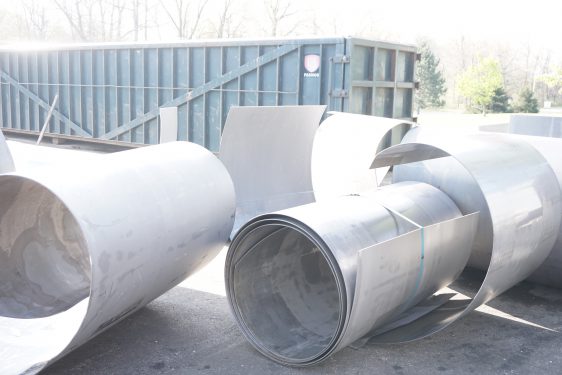When you think of the anything industrial, environmentally friendly probably isn’t the first term to come to mind, and often the opposite resonates more. Images of soot-covered workers and mounds of oil or toxic waste may come into the picture. But in many industries, the truth tells a different story. Believe it or not, one of those industries is one of America’s oldest. And while it hasn’t always been this way, the production of steel remains greener than ever even while meeting the ever-increasing demand for product. So just how does a steel company stay environmentally friendly?
Using Recycled Products
Making a commitment to choosing recycled material as opposed to raw is an environmentally conscious choice that Hascall has stood behind since 1971. Over 30% of the material used in our steel consists of recycled material. However, choosing to use recycled steel doesn’t mean sacrificing the quality of the end product. Utilizing recycled material in the production of new steel doesn’t cause any reduction in strength or durability compared to metal made solely from material such as iron ore, limestone, and metallurgical coke.
We consider our product and business “green” because steel produced with recycled metal cuts the need to mine for iron and coal, reducing the environmental footprint left behind during collection. Not only that but producing steel from raw or virgin materials requires more non-renewable energy than it does to produce from scrap metal. Every pound of steel recycled saves 5,450 BTUs of energy, enough to light a 60-watt bulb for over 26 hours.
Saving Landfill Space
Working with and producing steel that can be reused for other products after its scrap phase is known as an infinite process. Although the steel may not be made from 100% recycled material with having raw material mixed in, the finished product itself is 100% recyclable. This means less scrap metal being added to landfills across the nation.
Hascall is also proud to have an internal company program that reduces environmental impact. The Skid Recycle Program was implemented in our facility to reduce wooden palette waste in landfills and lessen the demand for new lumber as well. When a customer is done using the wooden palettes used to deliver their steel, we then retrieve the unused palettes from that customer. Palettes retrieved are then used to either send to other customers with deliveries or are used by employees heating their homes with the discarded wood.
Not only do our employees take part in the green initiative with wood palette home heating, but Hascall as a company will use scrap wood and hydraulic waste for heat during the winter months. The reuse of both of those materials helps in saving on what would have been the energy spent on electricity and natural gas. Recycling scrap wood and hydraulic waste also eliminates those additions to landfill space and reduces the energy it takes to dispose of both materials.
LEED Approved Building Materials
The Leadership in Energy and Environmental Design (LEED) program developed by the U.S. Green Building Council was put in place to improve the environmental standards and performance of U.S. buildings. Hascall prides itself on maintaining safe and effective practices of environmental design both in-house and for customer buildings as well. Supplying and selling steel framing approved by LEED to customers allows them to gain LEED accreditation through their green building materials. Architects, contractors, suppliers, and builders can all become LEED certified from using products that are 100% recyclable in their building structures.
While staying ahead of demand for product is a definite priority, it’s never an option to sacrifice environmentally safe practices. Every global industry should be committed to fulfilling the shared duty of staying Earth conscious in every way. At Hascall, we strive for keeping a light footprint behind in everything we do. You could say green is our favorite color of steel.

